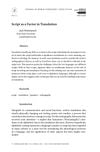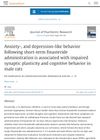
Alopecia areata often starts around age 23, can be permanent in 30% of cases, and treatments are usually temporary.
 March 2024 in “Homoeopathic links”
March 2024 in “Homoeopathic links” Individualized homeopathic treatment led to complete hair regrowth in a patient with stress-induced hair loss.
 1 citations,
April 2023 in “Frontiers in Immunology”
1 citations,
April 2023 in “Frontiers in Immunology” New treatments for hair loss from alopecia areata may include targeting immune cells, using stem cells, balancing gut bacteria, applying fatty acids, and using JAK inhibitors.
 31 citations,
July 2015 in “Clinical, Cosmetic and Investigational Dermatology”
31 citations,
July 2015 in “Clinical, Cosmetic and Investigational Dermatology” Hair restoration surgery effectively treats hair loss with natural-looking results, using techniques like stem cells and platelet-rich plasma.
 January 2023 in “Revista Da Associacao Medica Brasileira”
January 2023 in “Revista Da Associacao Medica Brasileira” The document concludes that women's health needs a holistic approach, considering all life stages, promoting lifestyle changes, regular exercise, proper diet, and vaccinations, with health professionals playing a key role in education and guidance.
10 citations,
January 1967 in “PubMed” Oral contraceptives often cause melasma and other skin issues.
 June 2002 in “Seminars in Cutaneous Medicine and Surgery”
June 2002 in “Seminars in Cutaneous Medicine and Surgery” Hair transplantation has improved to more natural-looking results and is complemented by effective non-surgical treatments, with ongoing research into hair follicle cloning.
 10 citations,
February 2015 in “Clinics in Dermatology”
10 citations,
February 2015 in “Clinics in Dermatology” The document concludes that changes in eyelashes and eyelid skin can indicate various local and systemic diseases.
 January 1998 in “Jaypee Brothers Medical Publishers (P) Ltd. eBooks”
January 1998 in “Jaypee Brothers Medical Publishers (P) Ltd. eBooks” Telogen effluvium is a condition that causes temporary hair loss due to stress or shock to the body.
 6 citations,
November 2007 in “Archives of Disease in Childhood: Education & Practice”
6 citations,
November 2007 in “Archives of Disease in Childhood: Education & Practice” The document concludes that accurate diagnosis of alopecia in children relies on thorough examination and history, and while treatments exist, none can alter the course of alopecia areata, which can significantly affect a child's psychological well-being.
 September 2023 in “Journal of Cosmetic Dermatology”
September 2023 in “Journal of Cosmetic Dermatology” Lower vitamin D levels are linked to higher CRP levels in people with a type of hair loss called alopecia areata.
 3 citations,
November 2020 in “Journal of The American Academy of Dermatology”
3 citations,
November 2020 in “Journal of The American Academy of Dermatology” The document suggests that more research is needed to confirm if baldness can indicate a higher risk of severe COVID-19 in men.
 2 citations,
October 2021 in “Asian Journal of Andrology”
2 citations,
October 2021 in “Asian Journal of Andrology” Medications for hair loss and prostate issues can significantly increase the risk of sexual side effects and other negative symptoms.
 2 citations,
August 2022 in “Clinical Case Reports”
2 citations,
August 2022 in “Clinical Case Reports” A 17-year-old girl had severe, on-and-off hair loss, likely due to COVID-19. She was treated with Vitamin D3, biotin, and other supplements, and saw some improvement within a month.
 August 2024 in “Journal of Cosmetic Dermatology”
August 2024 in “Journal of Cosmetic Dermatology” CGF injections may safely and effectively promote hair growth in androgenetic alopecia patients.
 1 citations,
January 2016 in “Journal of world literature”
1 citations,
January 2016 in “Journal of world literature” The conclusion is that the type of writing system used can significantly affect the translation of a text.
 October 2024 in “JEADV Clinical Practice”
October 2024 in “JEADV Clinical Practice” UK dermatologists commonly use corticosteroids and minoxidil to treat hair loss conditions.
 6 citations,
February 1974 in “The BMJ”
6 citations,
February 1974 in “The BMJ” The document concludes that scalp disorders can be treated with hair washing, specific shampoos, medications, and sometimes surgery or hair transplants, but hereditary baldness is untreatable.
5 citations,
December 2014 in “Molecular cytogenetics” A specific genetic change is linked to mental disorders, intellectual disability, and possibly autoimmune disease in a family.
 2 citations,
January 2013 in “Advances in Experimental Medicine and Biology”
2 citations,
January 2013 in “Advances in Experimental Medicine and Biology” Taurine might help prevent hair loss caused by stress.
 January 2014 in “International Journal of Athletic Therapy and training”
January 2014 in “International Journal of Athletic Therapy and training” A female runner's hair loss was caused by stress from surgery and recovery, but her hair returned to normal in 5 months.
 3 citations,
January 2019 in “International Journal of Trichology”
3 citations,
January 2019 in “International Journal of Trichology” The article concludes that treating hair loss requires careful research, understanding the causes, and personalized treatment plans.
 8 citations,
April 2020 in “Journal of Ethnopharmacology”
8 citations,
April 2020 in “Journal of Ethnopharmacology” Herbs might help with hair loss, but more research is needed to confirm their safety and effectiveness.
 19 citations,
May 2019 in “JAMA dermatology”
19 citations,
May 2019 in “JAMA dermatology” People with alopecia areata have similar overall death rates as others but higher risks of death from self-harm, psychiatric issues, and lung cancer in certain cases.
 August 2012 in “Journal of Evidence-based Medicine”
August 2012 in “Journal of Evidence-based Medicine” Minoxidil helps with hair regrowth in women with androgenic alopecia.
 April 2024 in “Journal of psychiatric research”
April 2024 in “Journal of psychiatric research” Short-term finasteride use in male rats caused anxiety, depression, and memory problems.
 February 2024 in “Bangladesh pharmaceutical journal”
February 2024 in “Bangladesh pharmaceutical journal” The herbal hair oil increased hair growth and reduced hair fall for most users without significant side effects.
 September 2016 in “Gynecology Obstetrics and Reproductive Medicine”
September 2016 in “Gynecology Obstetrics and Reproductive Medicine” Effective treatment for skin issues in women with PCOS includes oral contraceptives, antiandrogens, and other medications and procedures.
 17 citations,
February 2020 in “Journal of Pediatric and Adolescent Gynecology”
17 citations,
February 2020 in “Journal of Pediatric and Adolescent Gynecology” Early medical support for transgender youth is important for their health, with low regret for gender-affirming hormone use and a need for knowledgeable care providers.



























